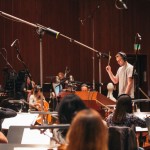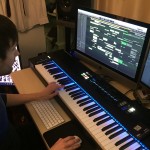I can’t tell you how excited I am to introduce you to S.F.A. Most of you know by now that I am obsessed with game music from Korea, especially when it comes to the Ragnarok Online and Granado Espada soundtracks. While the biographies in the Granado Espada booklet listed S.F.A as a group comprised of former soundTeMP members, little did we know that Sevin, the founder and principal producer of S.F.A was actually one of the founding members of soundTeMP.
While we touch on the topic of soundTeMP in this first international interview with Sevin, our primary focus is on S.F.A, including details about its members, its goals, and its approach to game scoring. We discuss specific tracks from the Granado Espada soundtrack and talk about what’s next for S.F.A, so join us for this exclusive interview with the very passionate Sevin.
Read the full interview after the jump.
OSV: Hello Sevin. As big fans of your work on Granado Espada, we’re very excited to be speaking with you about S.F.A. Let’s start with a general question about the team.
Can you give us a list of the members of S.F.A and tell us a little bit about yourself and the rest of the team? How did you put together this team, and what exactly does S.F.A (Sound Fashion Adviser) mean to you?
Sevin: Greetings! I’m really glad and appreciate meeting all the great fans of Granado Espada. I feel a bit nervous since this is my first interview abroad. First of all, let me introduce S.F.A in some general words: “South Korea’s professional game sound group who pursues music that tells a story through powerful performances.” The S.F.A group has 4 producers and is a family that is constantly changing numbers. Sometimes there comes a guest singer/non-regular session member dependsing on the situtaion. I’m sorry that I can’t tell you all the details, but I want you know that we’re a very “sticky” team comprised of people who really like game music.
The meaning of S.F.A is just what the word says – “advisor of sound fashion.” The team was established around 2004, and I named it without a specific reason. However, we get slight misunderstandings sometimes since there’s actually a company with a similar name.
OSV: I’ve actually read that you were one of the founding members of soundTeMP. I know the studio is very secretive, so I don’t want to ask you to reveal any secrets, but could you tell us about your personal experience working with the group? What titles did you work on, did you enjoy working with the team,
and given that the first CD from the studio was released in 2002 (Ragnarok Online Special Remix!!), what did the team work on from the period after it was founded in 1992 until 2002?
Sevin: As you’ve already seen from our history, soundTeMP was established in 1992 to be a team similar to the JDK Band in Japan since there was no professional game sound team in Korea at that time. The name of the team was temporarily given as soundTeMP (as in temporary) at first. I’m very proud of that I was there to establish a great team like soundTeMP, and I really loved my work while I was there.
I had left the team for awhile for personal reasons, and came back in 2000. At that time, the team was working on a game called Fortress2. I still remember the urgent request from the company that we needed to create 20 MIDI tracks in a week.
It reminds me of the delightful work with Mr. Hakkyu Kim’s Ragnarok Online, which helped me make connections for Granado Espada around 2001. I dealt with various titles over the 4 years until I left the team in 2004. We worked on SealOnline, Narsillion, Chunrang, Ark, Priest, and Flyff… but our different views on music finally lead me leaving the team. As you know about these kinds of issues, they might not be so happy with me telling you what I did specifically on the team.
OSV: In 2000, you were the co-president of soundTeMP and then moved to start S.F.A in 2004. What caused you to go independent and start your own studio after being such a prominent member of soundTeMP?
Sevin: I’ve wanted to create band-style music with grooves and rhythms with a kind of cross-over music style through various live works for a long time. You can say it’s the decisive reason that made me leave the team. It is really fun when you share the same ideas as the people you work with.
OSV: How did you and S.F.A come to work on Granado Espada? When you were first brought on board, what instructions were you given regarding the game’s audio? Having continued to provide music for the game, what does Granado Espada mean to yours and S.F.A’s career?
Sevin: So the focus is now on our team. As I mentioned earlier, our connection had been in place from Hakkyu Kim’s Ragnarok Online when I was at soundTeMP. The instructions to S.F.A were to “create the music you desire” – which meant that they were very flexible and unrestricted. We’ve done several works, but GE is one of our biggest titles, which allowed us to break from the past and jump to a new start.
OSV: S.F.A has a very diverse sound. “Violins of the Death” features excellent violin work alongside electric guitars, while “The G Appears” is a goofy track that sounds almost like “Rock Lobster” by the B-52s (do you know this song?). “Esa Promesa” is a Korean pop song with beautiful vocals, and “Laboro Nomen¡” is a jazz track. What can you tell us about these tracks? Why does the studio focus on providing such a diverse sound rather than specializing in one?
Sevin: Since we have several team producers, even if I request a single concept, I get back a diverse set of outcomes. Personally, I believe that “man cannot succeed without change,” and this is why S.F.A always wants to show you a diverse sound.
I actually went and checked out “Rock Lobster” for the first time, and I loved it. I love this kind of music! Thank you for introducing it to me.
OSV: One of the tracks that was added to the game later was “Rachada Fever” which is over ten minutes long. What can you tell us about the creation of this piece? Is it an important song?
Sevin: The concept of “Rachada Fever” is actually Bangkok’s famous amusement center – Rachada Road. I personally wanted to try a dreamy-style song, and IMC requested a trance piece at the time – so that’s the song that came out. It wasn’t actually that important or special but I’d like to give some meaning since it’s our first try at the trance genre. You know that trance songs are naturally lengthy, right?
OSV: What tools are being used by the individual members of the team? Do you each have a specialty?
Is any of it recorded live, and if so, do you play any instruments yourself?
Sevin: We’re using various sequencers based on MIDI, and I’m using Sonar 7.0. I’ve checked what our team producers are using – Protools, Cubase and so on. In my case, I used to work as a part-timer in a singing room (it’s a kind of karaoke) when I was a university student, so I’ve transcribed more than 100 Korean songs. The experience from there influences my work even now. We also have a live performer who is a very charming woman. She’s worked with us for over 3 years. Of course, all our team producers and I play piano and guitar.
OSV: We’ve heard that your two biggest hobbies are photography and travel. How do these hobbies influence your music writing? You’d think with travel you’d be exposed to all sorts of different cultures, and photography is based on a visual aspect. Do you feel this gives you an advantage when creating the diverse sounds that you’re known for?
Sevin: There’s a lot of stress associated with my job that cannot be avoided. The most important thing though is to control these stresses. I love photography and traveling. Traveling offers the unexpected, is enjoyable, and it’s a good opportunity to meet new people. Photography is a lot of fun, but once it’s printed, it’s easily erased and not an easy way to support yourself. It is hard to do it but it is very good for creative writing and further spiritual health.
OSV: I’ve noticed that the production values for music in games coming out of Korea are very good. Have you worked on games outside of Korea? How would you describe your work atmosphere in the past? Have you always had supportive teams and a decent budget to produce the music you want to produce?
Sevin: We have not had the chance to work outside of Korea, but we’d love to try. It was really hard around 2000, since most people had no understanding of game music. But it’s been changing since about 2004. The importance of game music finally lifted its head, and game companies started to increase the budget for game music. We cannot always get a satisfactory budget, but we won’t work with a game company which requests us the work with too low of a budget.
OSV: Is Granado Espada S.F.A’s biggest accomplishment to date? Are there other titles or projects that you feel deserve the attention of the gaming industry and your fans?
Sevin: Yes, it absolutely is our best accomplishment to date. It helped us break away from the dark past.
I can’t say much about it yet, but we were just assigned a project that will have an Asian feeling all around. I’m pretty sure that this game will satisfy you both in the game content and the music.
OSV: I know you’ve been busy providing additional music to Granado Espada after the initial release, but we haven’t heard any of your work in games after Granado Espada. Is there anything currently in the works that you’re able to tell us about?
Sevin: We’re still working on GE’s music and we will continuously keep it up. We’ve already created a large number of songs, but we’re not sure when they will be in the game. However, we’re also working on IMC’s next game, and it’s our main priority for 2008.
OSV: Sevin, we really appreciate your time, and have enjoyed speaking with you. Good luck with this IMC project, and we’re all looking forward to hearing what the team comes up with!
Sevin: My special thanks to you, Jayson, who made my dream to have an interview outside of Korea come true, and I thank my Japanese composer friend Osamu Kubota for introducing me to OSV.
Lastly, thank you to all of my fans!
Tags: Granado Espada, Interviews, Korean, S.F.A., Sevin, SoundTeMP










































Great interview, Jayson
Bon courage mon ami!
congraturation~^^
great interview with DJ Sevin!! props up to you guys! hope it’s alright for me to link this interview again in my blog for the benefit of GE fans/players.
[…] her off. Don’t get me wrong, it wasn’t terrible stuff, but it certainly wasn’t soundTeMP. If you had asked me, I would have told you that the Koreans seemed to know what they were doing […]
rock lobster??? *facepalm* o_O
Haha… well… it does sound like it.
Does anyone know where i can get SFA’s email as i wanted to find the notes for some of their songs but i cant find it anywhere.
Wow, this is an interesting interview.
Is difficult to look for info for S.F.A.
Imma big fan of S.F.A. Too bad i cant get their music soundtracks from here. But i listen to them everyday, since im also a big fan of GE…
nice work Jayson.